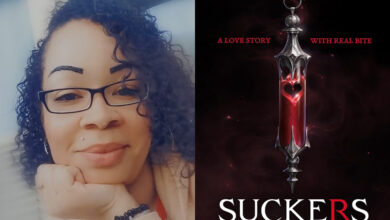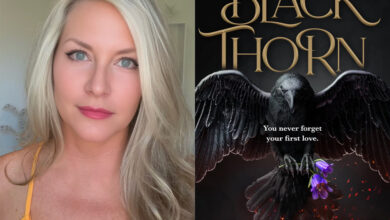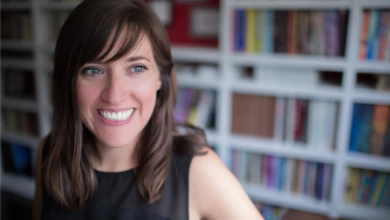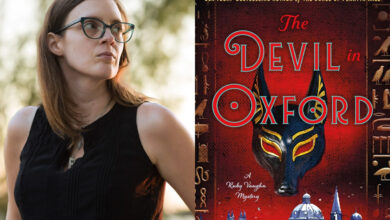The Compound author Aisling Rawle’s first book love was The Wind in the Willows – debutiful
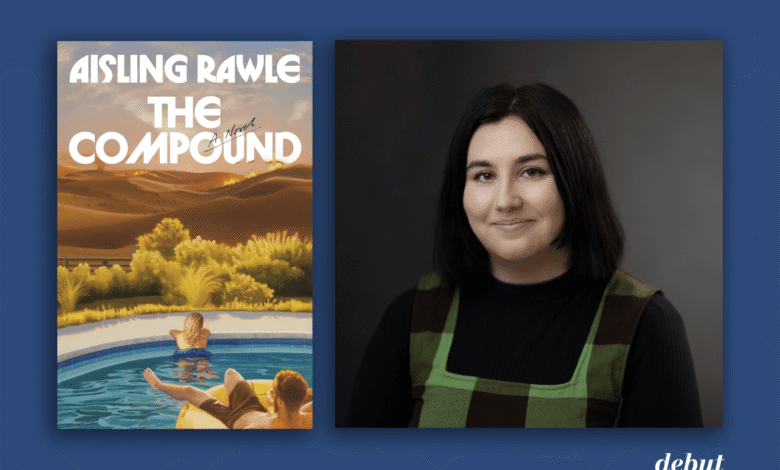
Aisling Rawle’s debut novel, The Compound, is a chillingly prescient exploration of reality TV, desire, and survival in a world teetering on collapse. Set on a remote desert compound where twenty contestants compete to outlast each other for luxury rewards and existential purpose, the story follows Lily, a bored and beautiful twenty-something, as she navigates the blurred lines between performance and reality, safety and spectacle, love and manipulation.
We asked the writer to answer our recurring My Reading Life Q&A so readers could get to know her and the books that shaped her life.
What was the first book you were obsessed with as a child?
This is a strange one, because it’s not a book I technically ever read. When I was very young, my mother read The Wind in the Willows by Kenneth Grahame to my older sister. They were in the room next to me, but I’d leave the door open and listen to it being read. Occasionally I’d sneak in and sit at the bottom of the bed and listen along, but generally I would lie very quietly in my own bed, straining to hear. It felt more exciting because it wasn’t meant for me; I remember very vividly the battle each night to not drift off to sleep, to hear how the chapter ended.
What book helped you through puberty?
The Picture of Dorian Grey by Oscar Wilde. I read it when I was thirteen or fourteen, and I remember feeling genuinely stunned that something so truly excellent existed. Then that dawning sense of wonderment, that there were surely more similarly transformative books out there. Wilde began my love of literature, but as well as that, his ruminations on beauty and vanity felt wonderfully refreshing in those image-obsessed teenage years.
What book do you think all teenagers should be assigned in school?
Ah, this is something I’ve often wondered about! I’ve definitely found that there’s no one book that suits every class, nor every student, yet the search continues. You can’t force a student to love a book as much as you do — you can only show them why you love it, and hope they understand. For a younger group, A Monster Calls and The Knife of Never Letting Go are such fantastic guidebooks for navigating difficult emotions like grief and shame as a young person. I so admire that Patrick Ness never condescends to his young readers; the confusion and uncertainty of adolescence is explored with such poignant consideration.
For the older student, I think Great Expectations is peerless. It is truly storytelling at its best. For the shorter attention span, Steinbeck’s The Pearl has so many important lessons, told with such grace and skill. I’ve also loved teaching THUG by Angie Thomas: it’s a book that really has everything.
If you were to teach a class on Damn Good Writing, what books would make the syllabus?
A Portrait of the Artist as a Young Man by James Joyce for understanding the landscape of interiority. Outline by Rachel Cusk as a reminder that stories are inherently an act of empathy, and that all stories matter.
Equally instructive as it is entertaining, Either/Or by Elif Batuman. Throughout this book, the protagonist, Selin, is trying to forge her identity as a writer. I learned so much from Selin’s glorious brain; her rich insights as much as her hapless floundering. Both Selin and Batuman rally against the confines of what a writer ‘should’ do, and what the process ought to look like.
To move away from novels, I would include Door into the Dark by Seamus Heaney, as proof of the beauty of the lens through which the world can be seen, and as a shining artefact of a master craftsman.
What books helped guide you while writing your book?
When I wrote The Compound, I had recently read Penance by Eliza Clarke and The Guest by Emma Cline; I felt that both did an incredible job of creating a delicious sense of unease, as well as biting social commentary.
In a broader sense, Animal Farm by George Orwell was in my mind as I was finding my feet with The Compound. The seemingly inevitable, corrosive force of greed that overshadows the animals’ best intentions is as tragic as it is pressingly relevant.
What books are on your nightstand now?
I’ve recently started What A Time To Be Alive by Jenny Mustard, a really sharp coming of age story. I’m also reading North Face by Mary Renault. It’s one of those books where I knew within the first twenty pages that I’d be bereft when it ended; luckily I have Let Me Go Mad In My Own Way by Elaine Feeney lined up to fill the Reanult-shaped gap.
Source link

